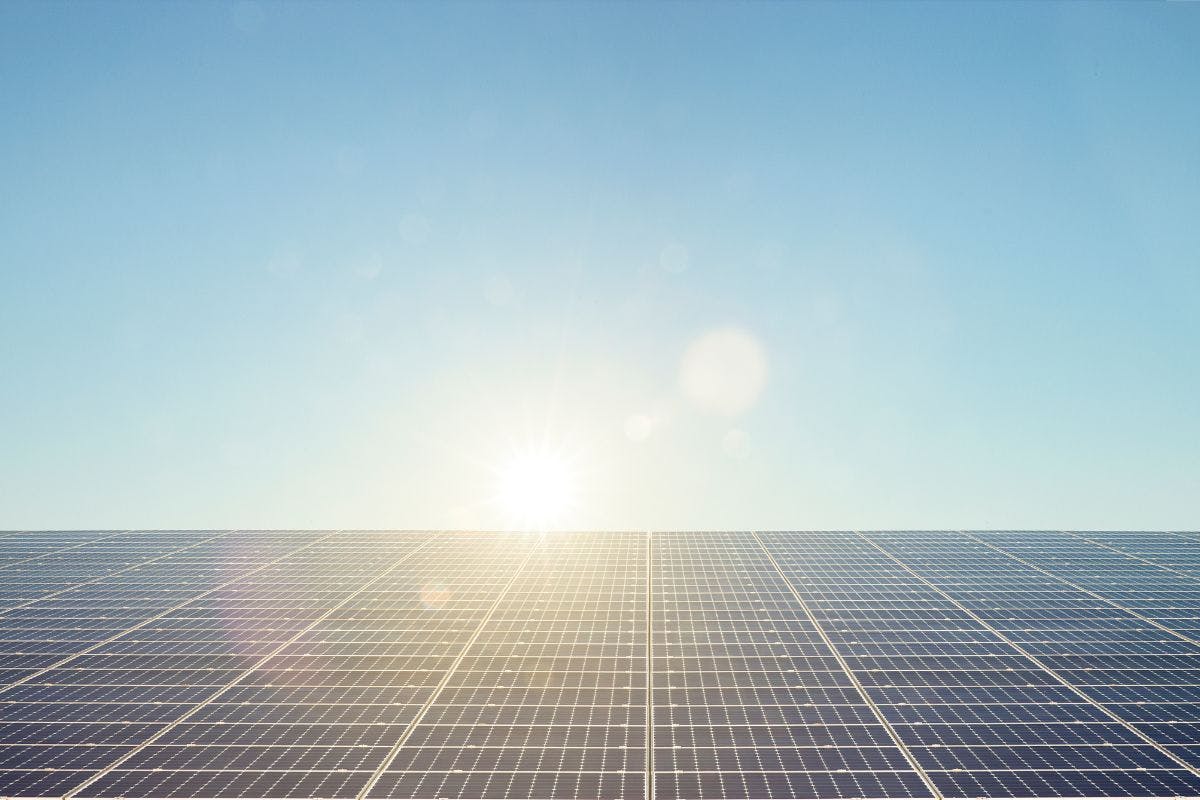How Does Temperature Affect Solar Panels?
Last edited
Author
Andrew Giermak
Solar and Electrification Writer and Editor
Editor
Andrew Blok
Electrification and Solar Writer and Editor

When you install solar panels at home, you expect them to be around for a long time. At least their expected lifespan of 25 years.
Over two and a half decades, they'll have to stand up to everything nature can throw at them: high winds, snow, and hot and cold temperatures. Most modern solar panels are designed to work from -40 to 185 degrees. Here's what you need to know about how temperature affects solar panels.
See how much you can save by going solar with Palmetto
The Effect of Temperature on Solar Panel Efficiency
Have you ever felt a little sluggish on a hot summer day? Well, solar panels can feel that way, too.
You might think solar power generation increases with every degree temperatures rise because, doesn’t more sun equal more power? But heat is not necessarily a solar panel’s best friend. Like many electronics (computers, phones, etc.), high temperatures can cause solar panel efficiency to drop.
When exposed to too high of temperatures, the flow of electricity within each solar cell is slowed, reducing the speed at which new solar power can be produced. If given a choice between hot summer heat or chilly winter conditions, assuming the same amount of sunlight, most solar panels prefer colder climates, producing more electricity per hour in cool weather (we will dive deeper into this later).
The Best Temperature for Solar Panels
Not all solar panels are the same, so not all panels have the same optimal temperature. However, it is generally proven that the ideal operating temperature for an average solar panel is 77 degrees Fahrenheit or 25 degrees Celsius. As a result, the manufacturer’s performance ratings of solar panels are usually tested at 77°F (25°C) or what’s called “standard test conditions.”
To get a bit technical, solar panels are rated with “temperature coefficients” that represent efficiency losses related to temperature changes above 77°F.
For example, let’s say your solar panel has a temperature coefficient of -0.35%. This means that for every degree above 77°F that temperatures increase, your solar panels will lose approximately 0.35% in power production efficiency. On an 80-degree day (3 degrees above ideal temperatures) solar panels would be 1.05% less efficient (.35 x 3 degrees).
In this example, with a marginal efficiency loss of 1.05%, your solar panel would work at a power production efficiency of 98.95%. (Solar panels can become much warmer than ambient temperatures.) Solar installers understand this and will take typical temperatures into account when designing your system.
According to the US Department of Energy, solar panels operate more efficiently in colder weather. (Panels generate electricity from the sunlight, not the heat.)
A 2023 study by a team from universities in Norway, Ethiopia, and India found solar panel effectiveness fell 0.0316% per 1 degree Celsius.
See how much you can save by going solar with Palmetto
Operating Temperature Range of Solar Panels
Although extreme conditions will affect solar panel performance efficiency, solar panels are rated to operate in a very wide temperature range. Designed to function in real-world conditions, most solar panels have an operating temperature range wide enough to cover every single day of your system’s multi-decade lifetime.
For instance, solar panels sold by Mission Solar, Jinko Solar, and Tesla Solar are all rated with an operating range of -40°F to +185°F. When was the last time you experienced a day outside of this temperature range? We are guessing almost never.
In the event of a deep freeze in your area (less than -40°F), your solar panels may be too cold to produce new electricity. While this should only be a temporary issue, monitoring your panels’ performance after the extreme temperatures have passed is a good idea to determine whether or not any permanent damage may have occurred.
Solar Panel Temperature and Seasonality
Generating electricity in various capacities throughout the year, the seasonality of solar panels results from both operating temperatures and the number of daylight hours per day.
In the summer, there are more hours of direct sun per day to produce solar electricity. Therefore, even if your panels worked at reduced efficiency due to the heat, the extended daylight time still allows plenty of solar power potential.
A few months later, cooler outside temperatures could have your solar system working at peak efficiency, albeit with fewer total sunlight hours to produce new power. On cold sunny days, solar panels can even thrive in winter weather, so long as they have direct access to sunlight.
Key Insights and Where to Learn More
To recap, outside temperatures may affect your solar panels’ efficiency, but this is nothing to worry about in terms of the long-term performance of your renewable energy system.
Today’s solar panels are built to handle each end of the temperature spectrum, with an operating range that reflects real-world conditions. Although the power output you can produce will depend on the day and season, you can always count on your panels to generate emission-free electricity every month of the year.
If you would like a few key stats to take home, here is a quick look at solar panel temperature range by the numbers.
- Ideal temperature for solar panel efficiency: ~77°F
- Minimum temperature for solar panels: -40°F
- Maximum temperature for solar panels: +185°F
Looking to get solar panels installed at your home? Use our solar savings calculator or contact us to learn more.
See what solar can do for you:
Frequently Asked Questions
Do solar panels heat the planet?
Solar panels do not heat the planet. In the sun, solar panels can get warm or hot. In fact, solar panels can keep your house a bit cooler by shading your roof.
Do solar panels work in the heat?
Solar panels work in the heat, although they lose some efficiency. Although extreme heat or cold will affect solar panel performance efficiency, solar panels are tested and rated to operate up to 185 degrees.
Do solar panels work in the cold?
Solar panels work down to temperatures well below zero. Panels gain efficiency as temperatures are colder. In typical temperature ranges for most of the US, cooler weather is better for solar panel efficiency than hot weather.
Disclaimer: This content is for educational purposes only. Palmetto does not provide tax, legal, or accounting advice. Please consult your own tax, legal, and accounting advisors.


